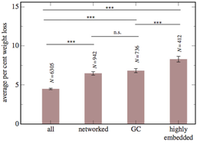
Social embeddedness in an online weight management programme is linked to greater weight loss
Abstract
The obesity epidemic is heightening chronic disease risk globally. Online weight management (OWM) communities could potentially promote weight loss among large numbers of people at low cost. Because little is known about the impact of these online communities, we examined the relationship between individual and social network variables, and weight loss in a large, international OWM programme. We studied the online activity and weight change of 22 419 members of an OWM system during a six-month period, focusing especially on the 2033 members with at least one friend within the community. Using Heckman's sample-selection procedure to account for potential selection bias and data censoring, we found that initial body mass index, adherence to self-monitoring and social networking were significantly correlated with weight loss. Remarkably, greater embeddedness in the network was the variable with the highest statistical significance in our model for weight loss. Average per cent weight loss at six months increased in a graded manner from 4.1% for non-networked members, to 5.2% for those with a few (two to nine) friends, to 6.8% for those connected to the giant component of the network, to 8.3% for those with high social embeddedness. Social networking within an OWM community, and particularly when highly embedded, may offer a potent, scalable way to curb the obesity epidemic and other disorders that could benefit from behavioural changes.